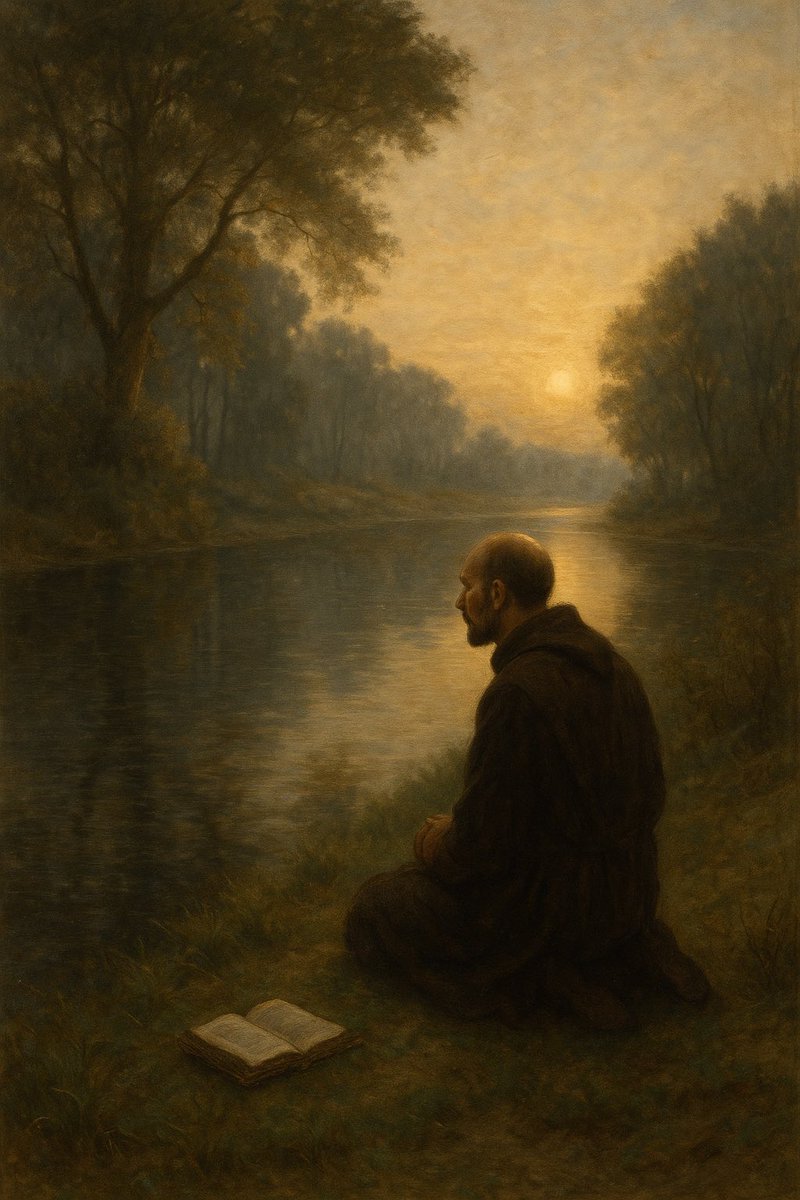1/14 🧵
Today, we walk with Saint Ignatius of Loyola—a man whose life began in the world’s glory, but ended in God’s. His journey takes us from castles and cannon fire to hospitals and holy poverty. Come with me. Let’s meet the soldier who became a saint.
Today, we walk with Saint Ignatius of Loyola—a man whose life began in the world’s glory, but ended in God’s. His journey takes us from castles and cannon fire to hospitals and holy poverty. Come with me. Let’s meet the soldier who became a saint.

2/14
Ignatius was born in 1491 in the Basque region of Spain, into nobility. He was the youngest of thirteen. His early life was marked by pride, ambition, and a hunger for war and romance. His heroes were knights—not saints.
Ignatius was born in 1491 in the Basque region of Spain, into nobility. He was the youngest of thirteen. His early life was marked by pride, ambition, and a hunger for war and romance. His heroes were knights—not saints.
3/14
He lived for honor. And when war broke out between Spain and France, he fought to defend the city of Pamplona. A cannonball shattered his leg. That moment changed everything. God used the very thing that broke him to begin healing him.
He lived for honor. And when war broke out between Spain and France, he fought to defend the city of Pamplona. A cannonball shattered his leg. That moment changed everything. God used the very thing that broke him to begin healing him.
4/14
As he lay recovering, he asked for stories of knights. But the house had only two books: one on Christ and one on the saints. With nothing else to read, he began reluctantly—and found his heart burning.
As he lay recovering, he asked for stories of knights. But the house had only two books: one on Christ and one on the saints. With nothing else to read, he began reluctantly—and found his heart burning.
5/14
When he imagined returning to his old life, he felt empty. But when he imagined living like Saint Francis or Saint Dominic, he felt alive. God was awakening something new in him: the grace to dream a holy dream.
When he imagined returning to his old life, he felt empty. But when he imagined living like Saint Francis or Saint Dominic, he felt alive. God was awakening something new in him: the grace to dream a holy dream.
6/14
After he healed, Ignatius limped his way to a shrine of Our Lady at Montserrat, laid down his sword, and gave away his noble clothes. At Manresa, he lived in poverty and prayer—and struggled deeply. Holiness did not come easily.
After he healed, Ignatius limped his way to a shrine of Our Lady at Montserrat, laid down his sword, and gave away his noble clothes. At Manresa, he lived in poverty and prayer—and struggled deeply. Holiness did not come easily.
7/14
He wrestled with scruples, fears, even despair. But God was not done with him. One day by a river, the Lord gave him a moment of profound illumination. He began to understand God’s presence in all things. That moment would shape his life—and ours.
He wrestled with scruples, fears, even despair. But God was not done with him. One day by a river, the Lord gave him a moment of profound illumination. He began to understand God’s presence in all things. That moment would shape his life—and ours.
8/14
He decided to become a priest. But first, he had to study. This proud soldier had to sit in class with schoolboys. He was even imprisoned more than once—people feared his passion. But the Lord was sharpening his fire, not extinguishing it.
He decided to become a priest. But first, he had to study. This proud soldier had to sit in class with schoolboys. He was even imprisoned more than once—people feared his passion. But the Lord was sharpening his fire, not extinguishing it.
9/14
He went to the University of Paris, where he met men who would change the world with him. They would become the first companions of what we now know as the Society of Jesus: the Jesuits. But in those days, they were just brothers seeking God.
He went to the University of Paris, where he met men who would change the world with him. They would become the first companions of what we now know as the Society of Jesus: the Jesuits. But in those days, they were just brothers seeking God.
10/14
They took vows of poverty and chastity, and placed themselves at the service of the pope. Ignatius did not want to bind his order to monasteries or abbeys. He wanted to be where the people were—in cities, in missions, in the world.
They took vows of poverty and chastity, and placed themselves at the service of the pope. Ignatius did not want to bind his order to monasteries or abbeys. He wanted to be where the people were—in cities, in missions, in the world.
11/14
The Jesuits became teachers, missionaries, confessors, scientists, and preachers. They went wherever the Church needed them most. It was a radical way of being—and still is. At the center of it all was one burning desire: to find God in all things.
The Jesuits became teachers, missionaries, confessors, scientists, and preachers. They went wherever the Church needed them most. It was a radical way of being—and still is. At the center of it all was one burning desire: to find God in all things.
12/14
Ignatius gave the world the Spiritual Exercises—a method of prayer and discernment that has helped generations hear the voice of God more clearly. It was forged in his own struggle, his own fire.
Ignatius gave the world the Spiritual Exercises—a method of prayer and discernment that has helped generations hear the voice of God more clearly. It was forged in his own struggle, his own fire.
13/14
He died in 1556, in a simple room in Rome, not far from Saint Peter’s. He was canonized in 1622. But titles meant little to him. He once said, “Go forth and set the world on fire.” And he did.
He died in 1556, in a simple room in Rome, not far from Saint Peter’s. He was canonized in 1622. But titles meant little to him. He once said, “Go forth and set the world on fire.” And he did.
14/14
Saint Ignatius of Loyola, pray for us—that we might surrender our pride, risk our comfort, and be formed in the furnace of God’s love. And when the cannonballs come, may they break not our faith—but our illusions.
Saint Ignatius of Loyola, pray for us—that we might surrender our pride, risk our comfort, and be formed in the furnace of God’s love. And when the cannonballs come, may they break not our faith—but our illusions.
• • •
Missing some Tweet in this thread? You can try to
force a refresh






